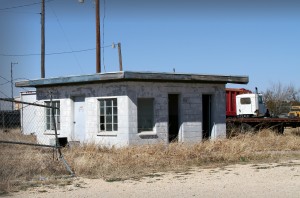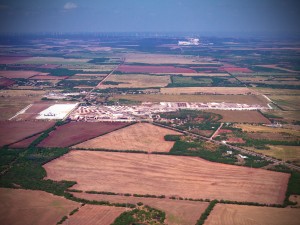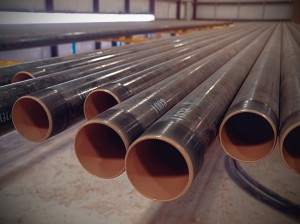ABILENE, TEXAS—Just four miles southwest of this town on Highway 277 South, the road that leads to San Angelo, is the community of Caps. For years, those driving down the highway barely encountered any indications that Caps even existed, except for a sign in front of the Caps Baptist Church and a highway sign that reads “Caps.”
Plowed fields, an abandoned drilling yard, and few vacant buildings made up Caps, where the biggest activity used to be watching B-1 bombers make their low-level entry into nearby Dyess Air Force Base. The speed limit remains 60 mph through the “city limits.”
But instead of becoming a long forgotten spot in the road, Caps today is a beehive of activity, a remarkable success story. Cliff Smith, owner of Smith Pipe of Abilene, jokingly refers to his company as the “One Stop Shop” of the oil and gas industry.
SPA Petco, L.P.; LCS Production Co.; and SPA Pipe and Supply, L.P.—a trio of entities collectively known by most people as Smith Pipe—has grown from Smith and just one employee in 1983 to a thriving business that has 383 bustling employees on a 480-acre complex in Caps. It is more than just a pipe yard, too.
In addition to having more than three million feet of used pipe on hand, Smith Pipe has an internal coating business to coat drill pipe and tubing for use in the Bakken Shale and Permian Basin. The company builds storage tanks, separators, heaters, water knockouts, and gun barrels that it ships all over the country. It has an active plugging business and its own production company and drilling rigs. It also refurbishes old pump jacks and fixes used tanks, wellheads, and sucker rods, offering a wide variety of pumping units and well heads, as well as hook-ups and down-hole equipment from packers to cementing equipment.
“There wasn’t a year that we failed to make a profit,” Smith proudly pointed out. “Sometimes it wasn’t a lot, but every dime went back into the business.”
While he has seen numerous ups and downs in the oil and gas industry during his 30-plus years in the business, Smith acknowledged that it was his ability to take advantage of the market during the downturns that has led to his company’s success.
“The first 10 years I was in business, oil fluctuated between $12 and $18 a barrel,” Smith recalled. “I don’t know how many times I heard ‘next year will be better.’”
Selling used pipe
Smith’s career began when he dropped out of college and his dad got him a job in 1980 selling pipe for Nucorp in Tye.
“I was the 51st salesman,” he said. “That was at the height of the boom. There were 50 other salesmen, and we sat in little cubicles and cold-called all day long. There were 45 drilling companies in Abilene back then. After a year-and-a-half of that, the bottom fell out.”
So Smith and several other Nucorp employees went to work for McClanahan Pipe and Supply in Dallas.
“But I couldn’t make a living,” he related. “Things got worse in 1982, and I figured out I could sell one truck of pipe by myself and make more money than I could in a month working there. Everyone was hunting used pipe.”
So Smith borrowed some inventory and with little cash opened his own business in 1983, selling used pipe out of a yard on Interstate 20 just east of Abilene. That was an old service station with outdoor bathrooms.
“Amazingly, people continued to drill wells at $12 oil,” he continued. “The used pipe business became competitive, and that drove me into the plugging business. In the late 1980s, I bought my first plugging rig. I had all the work I needed. That led to buying a couple more rigs. We gradually grew, and I bought a truck from a company that was in bankruptcy. Plugging got me into the oil and gas business. You can be as successful as you want to be if you are willing to work hard.”
In the early 1990s, Smith moved his business to its current location in Caps with the purchase of 20 acres. As Smith Pipe started plugging wells, some companies would just give Smith eight or 10 wells.
“At $14 to $18 a barrel and maybe 30 or 40 investors, it didn’t do anyone justice to keep the wells that were producing only one or two barrels a day,” he explained. “We slowly built our production. By plugging wells, we acquired a lot of equipment and began refurbishing pump jacks and fixing used tanks. We sold used well heads, tanks, sucker rods, and pump jacks.”
As the business expanded, Smith continued to acquire additional property, first purchasing the shuttered Rhodes drilling yard across Highway 277 from his business and then acquiring an adjacent 65 acres from a farmer. Smith Pipe now has 480 acres at the Caps site.
As the company’s production increased, Smith also bought a small drilling rig, and he said the company was fairly successful in finding oil, due to its drilling a lot of wells.
“In the late 1990s, as the industry was coming out of a terrible time, we got into the drilling business,” he continued. “About that time, the Barnett Shale was taking off. We bought B-W Tanks in Clyde and started repairing tanks and building new tanks. The tank business exploded because of the Barnett Shale. We also bought rigs out of bankruptcy from Delmar and [one from] Dudley Drilling. The next thing you know we had seven rigs operating in the Barnett Shale. We also kept a couple of rigs drilling for us.”
Finding a major field
Smith’s production company, LCS Production, continued to acquire old oil fields and increase production with infill drilling. The company then found a major new zone (the “Would Have Field”) on the Guitar lease northwest of Big Spring.
“We drilled 35 straight wells—with most coming in at over 300 bbl per day,” he stated. “We grew that field to over 3,000 barrels a day, and a bunch of gas.”
Smith then sold all of his production from the Guitar lease and others to CrownQuest in Midland for what he called a “significant” amount.
“That was our first big lick on the production side,” he recalled. “Oil was just $35 a barrel then, but in this business you’ve got to rake the money off the table every so often.”
Smith also sold his drilling company in 2003, although he kept a couple of rigs for his own use, continuing to drill in old oil fields. He has steadily kept two rigs running 24/7 for the last 10 years.
“I have made a career of drilling in old oil fields,” he explained. “A lot of these older wells were drilled on 40-acre spacing, but they didn’t bleed 10 acres. Or they developed casing leaks, leaving a lot of oil in the ground.”
One of those older fields was the Lake Trammel Field south of Sweetwater. Smith said it was making 60 barrels a day when he bought it.
“We ran production up to 600 to 800 barrels a day, and then we sold that in 2009, along with all of our other projects, for a ‘significant’ amount to Plantation Petroleum,” he said. “My partner in that portfolio was David Hunt, of Petro Hunt in Dallas. David is a grandson of H.L. Hunt.
“Total production in that portfolio was around 1,500 barrels per day and 3 mm gas. We kept drilling infill wells with an 80 to 90 percent success rate. It is all about how cheap you can get the oil and keep the well costs down.”
The sale to Plantation included 300 wells and it was after that huge selloff that the oilman started over yet again, beginning to put together his fourth different portfolio.
“We are almost back to warp speed now, running two rigs a day,” he noted.
An Abilene-based oil and gas attorney who has done legal work for Smith in the past, John Beckham, said that the oilman “has a knack for seeing value that others have often overlooked.”
Beckham said Smith “is known for being creative and somewhat unconventional in his approach to the oil patch”—a trait that “has led to great success” for him.
Smith Pipe is continuing its expansion. As the tank and vessel business grows, the company is building a new, modernized facility that he called “the best tank shop in the industry.” It has also built an “elaborate coating and sandblasting plant,” according to Smith.
Smith Pipe ships storage tanks and separators all over the country. The company is also building a new fiberglass plant that will allow it to build fiberglass storage tanks to store saltwater in the Permian Basin. The fiberglass facility should be up and running in the latter part of 2013.
The newest portfolio of LCS Production has grown to more than 100 wells and 1,000 barrels a day with an inventory of 300 additional drilling locations. It is currently redeveloping the White Flat Field near Trent. That field has made more than 18 million barrels in the past, according to Smith, but Smith has drilled five new wells in the field and plans to drill as many as 40 wells in the field.
LCS Production is also getting involved in the emerging Cline Shale play. He said his company drilled the vertical portion of its first Cline Shale well near Maryneal in Nolan County in November, but he is waiting to see the results of a nearby Devon Energy well before drilling the horizontal lateral. LCS is drilling its first horizontal well in the Cline Shale at this time in Coke County, drilling to 7,000 feet depth with a 4,100-foot lateral.
“This is a new world,” he marveled. “We can drill 10 or more of the old wells that we typically drill for the cost of one of these horizontal wells. We have 80,000 acres leased in the Cline Shale.”
Smith said he purchased core maps from seven counties, “hunting for the Big Cahuna.” But he admitted he was looking for a Mississippian play, not the Cline Shale, claiming logs in the area are nearly identical to the Mississippi Lime play currently going on in Oklahoma and Kansas.
“We thought we were on to something with the Mississippi play, and we picked up everything we could at a reasonable rate ($50 to $100 an acre),” Smith stated. “Then we ran into rancher who said he was offered $350 an acre. We found out that companies like Devon were seeking the Cline Shale, but we still didn’t believe it. So we finished up what we had and then sat back and watched.”
He called the Cline Shale in Glasscock and Sterling counties “proven,” but it is still to be determined what its success will be further east in Coke, Howard, Mitchell, Nolan, Scurry, Taylor, and Fisher counties. Smith said the Upper Cline, which is more prevalent the farther east you go, has been well-known marker that local geologists for years called the Three Finger Black Shale.
Smith also announced that in January he sold a 50-percent equity in his company to Gatlin Private Equity out of Dallas, an equity firm headed up by Al Hill Jr., a grandson of legendary oil pioneer H.L. Hunt. “To be a part of the history of H.L. Hunt is a dream come true for me,” Smith said.
“After 30 years, I finally got associated with a good partner,” Smith stated. “They are wonderful people, and they were looking for a chance to get back into the oil business. We have built a business that should have $100 million in revenue this year.”
Smith Pipe expects to drill in excess of 300 wells this year. It is building 20 tanks and 20 separators a day and hopes to be up to 30 a day in the next few months.
The biggest challenge to the company’s future growth, according to Smith, is what the government will do with the tax code and how it affects the oil industry.
“I have been an optimist for 25 years,” he said. “We have gotten to the size we have to deal with government bureaucracy. I now have DOT and safety people, along with a new set of paperwork every year. The amount of paperwork required by the government is unbelievable.”
Finding good people is also challenge.
“My generation and my father’s generation have a different work ethic,” he added. “It is a challenge to keep good people. People want a paycheck but not everyone wants to work. I am fortunate that I have a good core of people who have been with me for 20 years.”
Although all of Smith Pipe’s operations are currently at its Abilene location, he said he recently bought a 15-acre yard west of Odessa and plans to grow into the Permian Basin.
After a 35 percent increase in revenue from 2011 to 2012, Smith said the company, with its new equity partner, is primed for a big year in 2013 and beyond.
“We have a lot going,” Smith said.
He has picture of H.L. Hunt on his wall with Hunt’s favorite quote: “He who drills the most wells wins.” Says Smith: “And I try to follow that plan.”
From its tank construction and pipe business to its plugging rigs and its production operations that are growing into the emerging Cline Shale play, Smith has built a winner and that tiny spot in the road at Caps, southwest of Abilene, is one hopping place these days.











